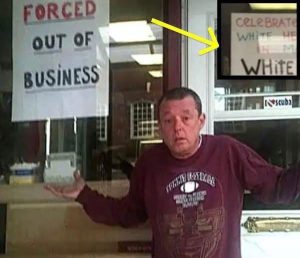Jim Boggess had a dream. As a proud small business owner in the town of Flemington, New Jersey, he wanted to do something that would both honor his cultural heritage and spark community pride. Boggess owned a deli on Main Street, and it was there, in the front window of his shop, that he posted a handwritten sign with a message that he believed was both sincere and meaningful. The sign read: “CELEBRATE YOUR WHITE HERITAGE IN MARCH, WHITE HISTORY MONTH.”

For Boggess, the sign was a simple expression of pride in his background. He didn’t view it as an act of exclusion or offense—just as other communities celebrated their own history and culture, he believed there was room for his heritage too. Unfortunately, the message did not resonate as he had hoped. Instead, it drew immediate and intense backlash. One customer in particular, Bhakti Curtis, was deeply disturbed upon seeing the sign. Curtis, who is biracial, saw the message as more than just a personal celebration—it felt to him like a direct mockery of Black History Month, which is observed every February in the United States.
Curtis didn’t keep his thoughts to himself. He took action by going to the local police department to file a formal complaint. In his report, he expressed concern that the message was offensive and racially insensitive. He also pointed out that the way the letter “T” in the word “WHITE” had been crossed resembled the shape of a cross, which he believed evoked imagery associated with the Ku Klux Klan. Though the police investigated the matter, they ultimately concluded that the sign did not meet the criteria for hate speech or criminal conduct. It was considered an expression of free speech, albeit one that sparked controversy.
Still, the court of public opinion had a different view. In the days that followed, Boggess found himself at the center of a heated debate. Some people in the community were outraged by the sign and accused him of promoting racism. Others felt that he had a right to express pride in his background just like anyone else. Regardless of where people stood, the fallout was swift and damaging. Over the course of four difficult days, Boggess was bombarded with questions, criticism, and calls to take down the sign. Eventually, under mounting pressure, he removed it. But the damage to his business had already been done.
What followed was a rapid decline in foot traffic and sales. Former customers who had once supported the deli stopped coming by. Some made it clear they no longer wanted to be associated with the business, while others quietly disappeared without explanation. Despite Boggess and Curtis eventually reconciling—the two even took a photo together shaking hands to show there was no personal animosity—the deli couldn’t recover from the controversy. Just a month after posting the sign, Boggess was forced to close the doors to his business for good.
In the aftermath of the closure, Boggess decided to turn to the public for help. He launched a GoFundMe campaign titled “Jimbos white history sign gone bad.” On the campaign page, Boggess shared his side of the story, trying to explain what he had intended and how things spiraled out of control. The campaign description read: “If you haven’t heard of this story and you want to read about it, just google Flemington white history or go on YouTube and search White History Month. Anyway, it went crazy for four days and then I had to take the sign down for various reasons. It was only supposed to be a white thing, but people read more into it than that.”
He continued, “I don’t think I deserve this just because I wanted to be proud of being white and be able to celebrate my heritage like everyone else does. If you read this, please leave a comment and what state you’re from so I can see where my support is coming from. Thank you for all the support and I WILL stay strong and hope to find a job. Thank you, Jimbo Boggess.”
Though his intentions may not have been malicious, the situation sparked a national conversation about race, heritage, and how those things are expressed in public spaces. Boggess began receiving letters and messages from people all over the country. Some offered words of encouragement. Others sent donations or shared their own stories of feeling misunderstood for expressing pride in their cultural background. Still, despite this wave of support from individuals who saw themselves in his story, the reality was that his local business was no longer sustainable.
What began as a personal expression of cultural pride ended with the collapse of a man’s livelihood. Boggess, who had once dreamed of running a thriving deli that served as a hub for the community, now found himself searching for a job and trying to piece together a new path forward. He held on to hope, but the sting of losing his American dream lingered.
This story, whether seen as a cautionary tale or an unfortunate misunderstanding, raises important questions about identity, free speech, and the boundaries of public expression. It also reflects the deeply rooted tensions in American society around race and history—how they are remembered, who gets to celebrate them, and what happens when those celebrations collide.
In the end, Jim Boggess never expected that a small sign in a deli window would spark a national conversation. But it did. And for better or worse, his story became part of a larger dialogue about who we are as a country, what we choose to honor, and how we live with one another in a society built on both shared freedoms and differing perspectives.





